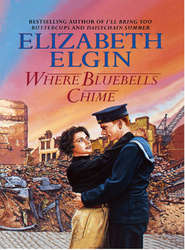По всем вопросам обращайтесь на: info@litportal.ru
(©) 2003-2024.
✖
Windflower Wedding
Автор
Год написания книги
2018
Настройки чтения
Размер шрифта
Высота строк
Поля
‘No, Tatty. You don’t go all red and blotchy when you cry like I do. And if you did, she would understand. Don’t forget Mam knows what it’s like. For a whole year she thought Dada was dead.’
‘Yes, and for almost a whole year I’ve known Tim is dead and that I’ll never see him again. But I’m glad for the time we had together, Daisy. No matter what, no one can take that away from me.’
‘No, love. And no one who cares for you as much as I do would ever want to. So let’s go and see Mam and have a look at my make-up?’
‘Okay.’ Tatiana looked up sharply as a bomber flew low overhead. ‘See it, Daisy? That’s a Halifax, a new one. They’ve got them at Holdenby Moor to replace the old Whitleys.’
‘Do you still do your aircraft recognition, Tatty?’
‘I do. If it flies, I can tell you what it is – ours or theirs. Come to think of it, why didn’t I join the ATS as an aircraft spotter? I’d have done very well at it.’
‘Well, you’re stuck with being a translator now. We’re both of us stuck with what we’ve got for the duration. And who’s to tell, Tatty, maybe you were intended to go to London? Maybe it was in your stars that you should.’
‘And meet someone else, you mean? Oh, no!’
‘I didn’t mean that. But you’ve made friends with your Uncle Igor, haven’t you, and somewhere in London something might just happen to at least help you to come to terms with losing Tim.’
‘Help me accept what I can’t change, you mean?’
‘Something like that – yes. I hope you will, Tatty. I can’t bear to see you like this. And maybe there’s some truth in what Mam always says – that nothing lasts; not the good times nor the bad. Maybe soon it’s going to be your turn for something good to happen.’
‘Maybe. And I really am learning to count my blessings, Daisy. Did you know I’m helping the WVS now; a sort of escort. I’ve done it twice. It was Sparrow’s niece Joannie started me off. She asked me to do it as a favour the first time, and I’m thinking of doing it regularly: taking airmen out. I don’t mean dating them, but they’re mostly aircrew, in need of an escort, really. And don’t look so bemused. The first time I did it I was shattered; didn’t think it was for me. But then I felt so sorry for them, you see.’
‘Wounded airmen, you mean? You go to the hospital and talk to them and walk with them?’
‘No. They could walk fine, those I met. But they have been in hospital and now they’re going out some, you see. Facing the world again, I mean.’
‘Facing the – Tatty, you don’t mean they’ve been burned?’
‘I mean just that. They’re all young men, Daisy, and some of them look awful. It’s mostly their hands and faces. Their hair and their ears are just fine; protected by their helmets. But their poor faces – oh, the first time I saw them I felt sick inside.’
‘Were they so bad, then?’
‘Yes. Their features all gone. But that wasn’t why I felt awful, Daisy. We were going to the theatre, you see – me and three other girls and four airmen. It was their first time out of hospital blues and into their uniforms again. And it was the first time they’d been out since – since it happened.’
It must have taken a lot of doing – for them, I mean.’
It must. Like I said, I felt sick, but I didn’t let it show. I smiled when I was introduced to my airman. I looked right into his eyes and smiled and do you know what, his eyes looked relieved. His face didn’t, because he can’t smile yet. But his eyes smiled.
‘He was a navigator called Sam. He held his arm out so gallantly, and I took it because that man could have been Tim. My wonderful Tim could have looked that way, and just for a second I was glad that he hadn’t suffered like that.’
‘I know what you mean, Tatty. All of them intelligent and good-looking – then for that to happen is awful.’
‘Yes. I know Tim dreaded it. Do you know he once said to me that he’d rather die than fry?’
‘Tatty! Don’t say such things!’
‘Tim said it, not me. Most aircrews say it. It made me cry so much he promised never to say such a thing again. And he got his wish in an awful kind of way. At least it was clean for him, and quick.’
‘Tatty – don’t. Tim wouldn’t want you to be like this.’
‘No, but he’d have wanted me to go out with those wounded airmen because they are worse than wounded, Daisy. They said there’s some wonderful work going on – skin-grafting and things like that. They can even build up noses again. Sam said he was glad about that because his original nose was awful. Said he hoped he got a better one second time round.’
‘I don’t know how he could joke about it.’
‘Nor me, because it isn’t just their poor faces that are wounded, it’s their pride too. Sam got a bit serious and told me that when he was in hospital, the girlfriend of the airman in the next bed came to visit and she started to scream and make a fuss when she saw him. He said the Ward Sister just got hold of her and all but threw her out. The girl never came back. She wrote later, and broke it off.
‘So they are really marvellous and that’s why I shall go out with them and dance with them and help them to come to terms with what’s happened. They’ll learn to accept it, I hope, and that special hospital helps a lot. But it’s still awful for them. Tim would have hated it.’
‘Oh, lovey!’ Daisy reached for her friend, hugging her, blinking away tears that filled her eyes. ‘Tatty Sutton, you’re a truly lovely person and I know why Tim loved you so much. He’d be proud of what you are doing.’
‘You think so?’
‘I know so, and I’m proud of you too! So let’s go to Keeper’s and take a peek at my make-up – and why I’m saving it I just don’t know!’
‘I do,’ Tatiana whispered. ‘And thanks, Daisy.’
‘Why, for heaven’s sake?’
‘For being my friend – and for understanding. And tomorrow, before I leave, we’ll go to see the rooks – okay?’
‘The good old rooks,’ Daisy smiled. ‘You bet we will!’
Keth had not done so much writing since his student days. He put down his pen, rubbing the back of his hand, frowning.
He would be gone for ten days, they told him – certainly no longer than two weeks. So write your letters to the people you usually send them to, they said; address them and date them as if you were still in Washington, and write them as if you were still in Washington too.
‘But my mother and fiancée will carry on writing to that address – I won’t get any letters!’ he had protested.
‘They’ll be redirected to you. You’ll get them – eventually.’
‘But why? And where am I going for ten days?’ Surely not another stupid course trying to make a soldier out of him when all he was good at was mathematics and code-breaking.
And then an awful thought filled his head and he quickly dismissed it because they couldn’t be sending him to make another parachute jump? He shuddered to remember the last, the only, jump he had made; tried to shut out the look of disbelief on his instructor’s face. And far worse than that had been the awful bruising he got on landing and how lucky he was, he’d been told, not to have been badly injured, and to go back to signalling because surely he was better at signalling than parachuting out of a plane!
‘Where you’re going you’ll know when you’ve been kitted out,’ he was told. ‘And you can leave your stuff here because here’s where you’ll be coming back to.’
‘I see,’ he’d said, but he hadn’t understood a word of it because they still weren’t giving straight answers to straight questions. All he knew was that the muscular sergeant major he encountered on his first night at Castle McLeish was a drill instructor who supervised assault courses and who took great delight in putting officers with soft hands through it time and time again. He could also be very insulting – respectfully insulting, that was!
So Keth had written two letters to his mother and four to Daisy and he would have to write at least two more because usually he wrote to Daisy every day.
Two of the letters he had supposedly written from Kentucky where he was having a weekend with Bas and Kitty’s parents, told how delighted they were that Kitty and Drew were engaged and how sad Mrs Amelia was not to be having the time of her life organizing engagement showers and fussing over her daughter’s trousseau. He felt all kinds of a heel as he wrote them.
Trouble was, he had seen no evidence yet of anything in the least familiar to him. As far as he was concerned, Castle McLeish was little better than a drill camp and Keth Purvis was being toughened up for something that this far had nothing to do with Enigma nor bombes nor code-breaking. Something, somewhere, didn’t fit and the more he thought about it, the more apprehensive he became.
If only somebody would say – in answer to his oft-asked question – ‘Yes, Purvis, this is what you are here to do,’ then go on to explain exactly what it was they wanted of him and why he was going away for ten to fourteen days. It was a simple enough request to make but it had not been answered. Nor had anyone looked him straight in the eye and that, he decided, was what made him even more apprehensive.
Well, he’d had enough! He laid down his pen, picked up his cap, in case it became official, and made his way to the mess where he knew he would find the adjutant. And he would have answers to his questions; eyeball-to-eyeball answers, or his name wasn’t Keth Purvis!











